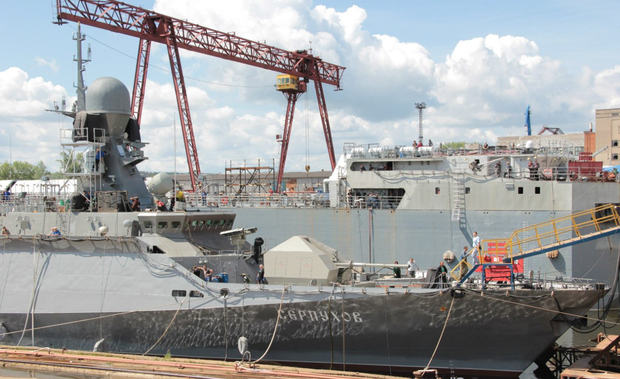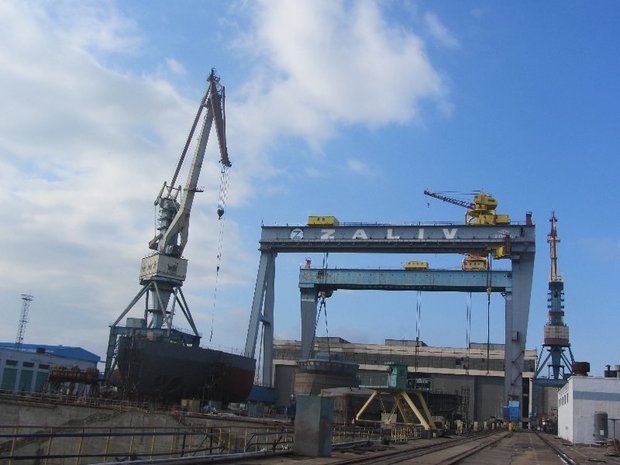Rogozin lays the keel of Grad and urges to start production of ship engines in Tatarstan
Zelenodolsk has officially started the construction of the tenth Buyan-class corvette and received a commendation for assistance to the Crimean plant Zaliv in Kerch
''The Crimean topic'', which MIC does not like to advertise, was suddenly raised by Deputy Prime Minister Dmitry Rogozin during his visit to the Zelenodolsk plant named after Gorky. Chief curator of the defence complex thanked Zelenodolsk workers for the help to the shipbuilding plant Zaliv in Kerch. The authorities are going to use Tatarstan experience to rescue the ''drowning'' Sevastopol ship-repair factory, said Rogozin. In addition, Vice Prime Minister urged to begin production of Russian engines for ships. The correspondent of Realnoe Vremya visited the keel laying.
The Black Sea Fleet is waiting for small missile ships
The official reason for the visit of Russian Deputy Prime Minister Dmitry Rogozin at the Zelenodolsk plant named after A. M. Gorky JSC was the keel-laying ceremony of the tenth small-size missile ship of the project 21631 Buyan-M, designated for the Russian Navy. Opening the ceremony, Dmitry Rogozin said that the construction of the small-size missile ship Grad has become an important event in the implementation of the state program of armaments by 2020, as small-size missile ships were selected by the Russian Navy to protect the borders.
For Zelenodolsk shipbuilders its construction is really crucial. A year ago, the fate of the project hung in the balance. Then it seemed that the construction of the small-sized missile ship of small tonnage (up to 1 000 tonnes) designed for shallow seas and large rivers (conditionally — the class ''river-sea'') could be closed because the Russian Navy was looking for an alternative among powerful ships. By that time, at the stapls of the plant there had already been built five ships of this project — the lead ship Grad Sviyazhsk and the follow ship Uglich, Veliky Ustyug, Zeleny Dol and Serpukhov. And this series of Buyans could be terminated.
However, the turning point in favour of keeping ''small ships'' was the signing in August of this year of the contract with the Russian Defence Ministry on the construction of three small-size missile ships at the Zelenodolsk plant named after A. Gorky, which will renew the series for another few years. ''There will be built 12 in total,'' specified in the press service of the enterprise. ''At present, under current contracts, the Navy are building four ships. They are on different stages of readiness.''

A commissioning of the tenth small-size missile ship is scheduled for the end of 2017, and the plant will continue to build Buyans for the Russian Navy. As Dmitry Rogozin told the journalists, the need in saturation of ships of this class by the Black Sea Fleet remains.
Interestingly, with the keel laying of the tenth ship, the commander in chief of the Russian Navy terminated the tradition to name small-size missile ships in honour of small cities of the country. If the previous four ships were named Vishny Volochek, Orekhovo-Zuevo, now the new ships will reflect the strength of the element. However, representatives of the Russian Navy preferred not to comment on the change of ship names.
''One can talk about solidarity with Crimea as much as they wish, but to take the order from yourself and to give it to Crimeans, as Zelenodolsk did, is worth a lot''
The continuation of the construction of small-size missile ships has prompted Dmitry Rogozin to speak about the revival of shipbuilding in Crimea. Speaking to Zelenodolsk shipbuilders, he said that their plant has become the first to extend a helping hand to residents of Crimea. According to him, by the time the sector had been in complete ruin. ''As if Messerschmitt has flown over the plant,'' he compared.
''Three years ago, when Crimea became part of Russia, there appeared a problem on the rise of the shipbuilding industry. It is Tatarstan helped to recover the plant Zaliv in Kerch. We can say, between Zelenodolsk and Kerch there is an ancestral connection,'' said Vice-Premier, adding that over the past three years, the plant has completely recovered and continues to work on the orders given to them. ''One can talk about solidarity with Crimea as much as they wish, but to take the order from yourself and to give it to Crimeans, as Zelenodolsk did, is worth a lot.''
Three years ago, there were rumours that Ak Bars Holding, co-owner of the Zelenodolsk plant named after Gorky, acquired the Kerch shipbuilding plant Zaliv. Later, Zaliv became known as part of an investment project of the Zelenodolsky plant. According to RBC, it was planned to spend about 4,6 billion rubles for the reconstruction of the enterprise. Now, apparently, the deal is completely closed. However, there is no official confirmation of possession by Tatarstan enterprises of the Crimean plant. According to EGRUL (Uniform State Register of Legal Entities), the Kerch company belongs to private individuals.

However, not only Tatarstan shipbuilding companies came to Crimea. According to Dmitry Rogozin, that time Russia's government also appealed to the St. Petersburg plant Pella to save the shipbuilding plant More in Feodosia. By the way, last year there was laid the keel of a small missile ship of the new generation. It was given the name Storm.
''Now we have another problem,'' shared the plans Dmitry Rogozin in an interview with reporters, ''it is the Sevastopol ship repair plant. It is developing slower than plants in Feodosia and Kerch. Here, in Moscow and in St. Petersburg, we are deciding how this plant will develop. Here we will use the experience of the Zelenodolsk plant,'' he assured, adding that Russian defence industry was the first to come to support Crimea with hard cash, orders and prospects.
Tatarstan is assigned marine engineering
Dmitry Rogozin was pleased in Tatarstan by the fact that the plant began to develop production of marine equipment. ''It often happens that we produce hull ourselves, but everything else (technical stuffing) we import from, for example, Finland, Germany and other countries. Through this kind of pressure they can exert on us so that we stopped our projects. Therefore, it is important to develop this area at the Zelenodolsk plant,'' he explained.
Rogozin expressed hope that the Republic will respond to the idea to develop power units for ships, ''Today we have such production in St. Petersburg at the plant Zvezda. And we would like Tatarstan to think on this topic. If you will have such desire, we will support. Diesel equipment is produced by KAMAZ, and it is necessary to consider naval shipbuilding became a ''landmark'' of Tatarstan. We will discuss this topic with the government of the Republic of Tatarstan,'' concluded Rogozin.